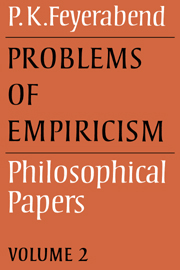Book contents
- Frontmatter
- Contents
- Introduction to volumes 1 and 2
- 1 Historical background
- 2 Classical empiricism
- 3 The structure of science
- 4 Two models of epistemic change
- 5 Philosophy of science versus scientific practice
- 6 Mach, Einstein and the Popperians
- 7 Wittgenstein's Philosophical Investigations
- 8 Consolations for the specialist
- 9 Popper's Objective Knowledge
- 10 The methodology of scientific research programmes
- 11 More clothes from the emperor's bargain basement
- Sources
- Name Index
- Subject Index
2 - Classical empiricism
Published online by Cambridge University Press: 05 June 2012
- Frontmatter
- Contents
- Introduction to volumes 1 and 2
- 1 Historical background
- 2 Classical empiricism
- 3 The structure of science
- 4 Two models of epistemic change
- 5 Philosophy of science versus scientific practice
- 6 Mach, Einstein and the Popperians
- 7 Wittgenstein's Philosophical Investigations
- 8 Consolations for the specialist
- 9 Popper's Objective Knowledge
- 10 The methodology of scientific research programmes
- 11 More clothes from the emperor's bargain basement
- Sources
- Name Index
- Subject Index
Summary
1. In the present paper I want to describe certain features of post-Galilean, or ‘classical’ science that deserve greater attention than has been given them so far. These features are summarized in the following three points.
(i) The practice of post-Galilean science is critical in the sense that it allows for the revision of any part of it, however fundamental and however close to ‘experience’. Resistance must of course occasionally be overcome, but the resistance is never strong enough to stabilize completely some particular piece of knowledge.
(ii) This critical practice is accompanied by a dogmatic ideology. The ideology admits that science may contain hypothetical parts. But it is emphasized that such parts are preliminary, that they will either disappear as the result of further research, or will turn into trustworthy theories. Moreover, it is assumed that all theories rest on one and the same stable foundation, experience. It is experience which supports, and gives content to, our ideas without itself being in need of support and interpretation.
(iii) Thus we have on the one hand the assumption of a stable foundation while we are on the other hand engaged in an activity that prevents such a foundation from ever coming into existence. Now the peculiarity of post- Galilean ‘classical’ science I want to describe consists in the manner in which this abyss between ideology and practice is bridged: first, experience is identified as that part of a newly conceived hypothesis that can most readily be illustrated by simple and eye-catching procedures.
- Type
- Chapter
- Information
- Problems of EmpiricismPhilosophical Papers, pp. 34 - 51Publisher: Cambridge University PressPrint publication year: 1981
- 2
- Cited by

